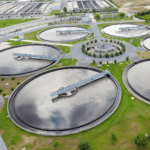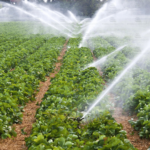
Biotechnological solutions for Wastewater treatment: Functional Solutions for a Sustainable Future
21/02/2025
Clean Water: Technical and Biotechnological Solutions for the Sustainable Management of Water in Agriculture and Livestock
21/03/2025Modern agriculture faces the challenge of balancing two fundamental needs: protecting crops through phytosanitary treatments while simultaneously reducing the environmental impact of these interventions. With increasingly stringent environmental regulations and a growing demand for organic and sustainable products, it becomes essential to adopt innovative solutions that optimize the use of phytopharmaceuticals, limit their dispersion, and promote the bioremediation of contaminated soils. In this context, innovation and research play a key role in ensuring efficient agriculture that respects the ecosystem.
Index
- Efficiency and Sustainability in Phytosanitary Treatments
- Strategies and Technologies for Sustainable Treatment Management
- NaturVeba® Agro Oils: Optimizes Treatment’s Application
- EnzyVeba® 00PF: Bioremediation for Soils and Volumes
- Strategies to Reduce the Accumulation of Phytosanitary Residues
- Future Perspectives: Agriculture 4.0 and Environmental Sustainability
- Conclusions: Towards Responsible and Cutting-Edge Agriculture
Efficiency and Sustainability in Phytosanitary Treatments
Phytosanitary treatments are useful for protecting crops from insects, pathogenic fungi, and other threats, but their intensive use can result in some undesirable effects, including:
- Emissions and spread: During application, a portion of the products il likely to be dispersed into the air, affecting not only the target crops but also the surrounding areas.
- Drift effect: Sprayed droplets can be carried by the wind to non-target areas, reducing the effectiveness of the treatment and potentially contaminating the surrounding environment.
- Residues on the soil: The use of some phytopharmaceuticals can leave residues in the soil for many years.
To address those issues, Paneco Ambiente is enabling smart and innovative solutions and practices to both optimize treatments while simultaneously reducing environmental impacts.
Strategies and Technologies for Sustainable Treatment Management
Optimization of Equipment and Nozzle Selection
The first lever of intervention is the proper calibration of equipment. The use of modern sprayers and nebulizers, together with nozzles designed to produce droplets of controlled size, is fundamental to:
- Limit drift effect: High-performance nozzles help to achieve a more precise distribution of the product, reducing droplet dispersion.
- Ensure uniform coverage: Proper calibration allows the product to be applied evenly over the entire crop surface, maximizing treatment effectiveness.
- Optimize consumption: Precision in application enables the use of the correct amount of product, avoiding waste and reducing environmental impact.
The Importance of Biotechnological Products
Another fundamental aspect is the use of biotechnologies, which can enhance the action of phytosanitary treatments:
- Wetting and adhesive action: These products improve the distribution of the product on the leaf surface, ensuring longer contact and greater effectiveness.
- Reduction of evapotranspiration: Some solutions help keep the solution in contact with the plant for extended periods, enhancing the protective action of the phytopharmaceutical.
- Minimization of drift and dispersion of phytosanitary products: In certain applications, drift is a serious problem; using specific formulations can prevent this issue.
Nature and Biotechnology: Examples of Innovation for Sustainable Agriculture
NaturVeba® Agro Oils: Optimizes Treatment’s Application
NaturVeba® Agro Oils is a concentrated liquid product registered as an adjuvant—a booster for plant defenses—certified for use in organic agriculture. Its formulation, based on a selected blend of vegetable oils, allows to:
- Reduce emissions, exhalations, and odours: The use of NaturVeba® Agro Oils lowers the dispersion of phytosanitary products, limiting air/soil contamination, drift effects, and any undesirable odours.
- Improve wetting and adhesive action: It promotes a more uniform distribution, optimizing treatment effectiveness.
- Ensure compatibility with organic agriculture: Being a natural and biodegradable product, it leaves no residues and does not require waiting periods.

NATURVEBA AGRO OILS
Reduce emissions of plant protection products during treatments
Why to choose it:
- ✓ Reduce drift effect
- ✓ Reduction of evapotranspiration
- ✓ Minimization of drift and dispersion of phytosanitary products
EnzyVeba® 00PF: Bioremediation for Soils and Volumes
It is important to adopt bioremediation measures to counteract the accumulation of phytosanitary residues in soils and in irrigation and wash water from treatment tanks. EnzyVeba® 00PF represents an instrumental solution in this field:
- Natural bioremediator: Certified for organic agriculture, EnzyVeba® 00PF neutralizes the residues of phytosanitary products that tend to accumulate in the soil.
- Acceleration of the bioremediation process: Thanks to its high content of non-GMO microorganisms, the product promotes and accelerates the natural degradation process. It helps for restoring soils, lowering pollutants in irrigation water, and wash water from treatment tanks. It helps to comply with regulations and enables a healthier production.
- Versatility of application: It can be used to treat soils in open fields or greenhouses, as well as to remediate volumes in tanks, cisterns, and irrigation water collection systems, ensuring effective results in a short time.
- Sustainability and cost-effectiveness: In addition to being completely biodegradable, EnzyVeba® 00PF offers significant cost savings compared to traditional remediation methods, ensuring a substantial reduction in pollutant loads.

ENZYVEBA 00PF
Reduce residues of plant protection products in the soil
Why to choose it:
- ✓ Certified for organic agriculture
- ✓ offers significant cost savings compared to traditional remediation methods
- ✓ ensure effective results in a short time
Guidelines for an Integrated and Sustainable Management of Phytosanitary Treatments
Strategies to Reduce the Accumulation of Phytosanitary Residues
In parallel to an optimised application of treatments, it is essential to adopt measures that prevent the accumulation of chemical residues in the soil and in wash and irrigation water. Among the most effective strategies are:
- Crop rotation and diversification: Promoting greater soil biodiversity to reduce dependence on repeated chemical treatments.
- Use of biodegradable products: Integrating biotechnological solutions that improve the distribution and effectiveness of phytopharmaceuticals, thereby limiting excessive application.
- Optimization of distribution: Carefully calibrating equipment to ensure targeted coverage and reduce waste.
Bioremediation of Contaminated Soils
When phytosanitary residues accumulate, a bioremediation strategy is necessary to restore the quality of the soil and water volumes:
- Implementation of EnzyVeba® 00PF: Use this natural bioremediator to neutralize pollutants and to accelerate the degradation of phytopharmaceutical residues. Its application quickly reduces pollutant loads, making soils more fertile and safer for cultivation.
- Soil quality monitoring: Conduct periodic multi-residue analyses to verify the effectiveness of remediation and adjust treatments based on the results.
- Documentation and traceability: Record every intervention to ensure compliance with environmental regulations and facilitate long-term agronomic management.
Future Perspectives: Agriculture 4.0 and Environmental Sustainability
The adoption of Agriculture 4.0 is revolutionizing the agricultural sector, integrating digital technologies and automated systems to make agronomic practices increasingly efficient and sustainable. Some key aspects include:
- Targeted interventions: The use of drones, sensors, and advanced software allows to apply treatments only where necessary, reducing waste and environmental impacts.
- Dosage optimization: Real-time analyses enable the calculation of precise dosages, minimizing the use of phytopharmaceuticals while maximizing the effectiveness of interventions.
- Transparency and traceability: Digital systems ensure that every operation is recorded, facilitating compliance with environmental regulations and strengthening the trust of end consumers.
By integrating innovative technologies with eco-friendly products such as NaturVeba® Agro Oils and EnzyVeba® 00PF, agricultural companies can establish a production model that combines efficiency, safety, and environmental responsibility—paving the way for a new era of sustainable agriculture.
Conclusions: Towards Responsible and Cutting-Edge Agriculture
The evolution of phytosanitary treatments and the reduction of environmental impact are essential aspects of modern and competitive agriculture. The integration of advanced technologies, optimization of equipment, and the use of adjuvants and natural bioremediators are key tools for protecting crops while safeguarding the environment.
Innovative products such as NaturVeba® Agro Oils and EnzyVeba® 00PF demonstrate that it is possible to combine efficiency with sustainability, offering concrete solutions to improve the application of phytosanitary treatments and accelerate the bioremediation of contaminated soils. In this way, agricultural companies can not only optimize operational costs but also ensure responsible and ecosystem-friendly management.
Investing in innovation and integrated practices is the key to a future in which crop protection and environmental safeguarding go hand in hand, contributing to agriculture that is increasingly responsible, technologically advanced, and sustainable.
If you are a professional in the agricultural sector and wish to explore how to integrate innovative solutions to improve the effectiveness of your phytosanitary treatments and reduce environmental impact, contact us for personalized consultation. Discover how NaturVeba® Agro Oils and EnzyVeba® 00PF can support your operations, ensuring safe, efficient, and sustainable prevention or treatment interventions.
In conclusion, the evolution of phytosanitary treatments and the reduction of environmental impact are highly topical issues for the agricultural sector. By adopting advanced technologies and integrated practices, it is possible to achieve targeted and responsible interventions capable of protecting crops without compromising ecosystem health. Products such as NaturVeba® Agro Oils and EnzyVeba® 00PF are examples of how innovation can be harnessed in the service of sustainability, providing an additional tool to ensure the effectiveness and sustainability of treatments in an increasingly environmentally focused context.












